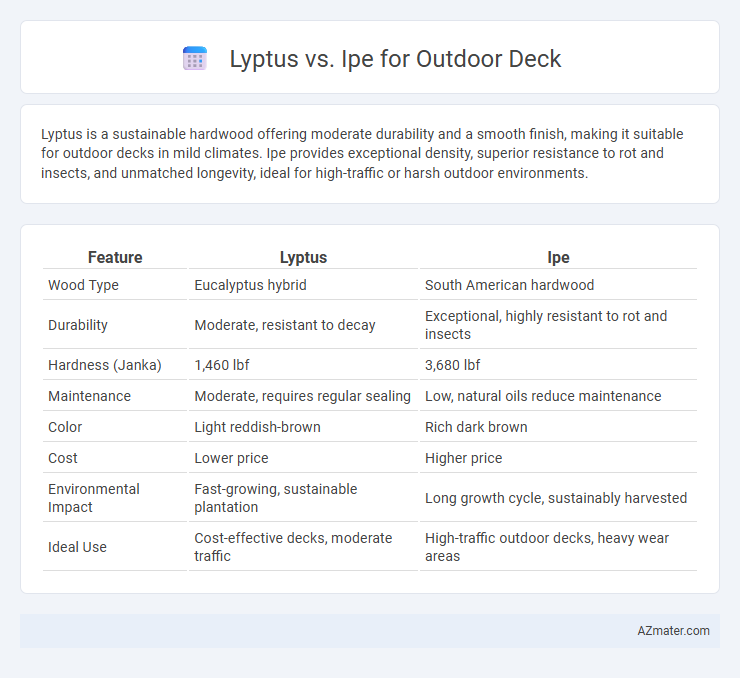Lyptus is a sustainable hardwood offering moderate durability and a smooth finish, making it suitable for outdoor decks in mild climates. Ipe provides exceptional density, superior resistance to rot and insects, and unmatched longevity, ideal for high-traffic or harsh outdoor environments.
Table of Comparison
| Feature | Lyptus | Ipe |
|---|---|---|
| Wood Type | Eucalyptus hybrid | South American hardwood |
| Durability | Moderate, resistant to decay | Exceptional, highly resistant to rot and insects |
| Hardness (Janka) | 1,460 lbf | 3,680 lbf |
| Maintenance | Moderate, requires regular sealing | Low, natural oils reduce maintenance |
| Color | Light reddish-brown | Rich dark brown |
| Cost | Lower price | Higher price |
| Environmental Impact | Fast-growing, sustainable plantation | Long growth cycle, sustainably harvested |
| Ideal Use | Cost-effective decks, moderate traffic | High-traffic outdoor decks, heavy wear areas |
Introduction to Lyptus and Ipe Decking
Lyptus is a sustainable hardwood derived from eucalyptus trees cultivated in managed plantations, known for its fine grain, light reddish-brown color, and resistance to decay, making it suitable for outdoor decking. Ipe, often called Brazilian walnut, is a dense, tropical hardwood prized for its exceptional hardness, deep brown color, and superior durability against weather and insects, widely used in premium decking applications. Both woods offer robust performance for outdoor use, with Lyptus emphasizing renewable sourcing and Ipe delivering unmatched longevity and hardness.
Durability and Longevity Comparison
Lyptus wood offers moderate durability with resistance to decay and insects, making it suitable for outdoor decking but generally less resilient than Ipe. Ipe boasts exceptional hardness and density, providing superior resistance to scratches, rot, and weathering, which results in a significantly longer lifespan of up to 40-50 years with proper maintenance. When comparing longevity, Ipe outperforms Lyptus by maintaining structural integrity and aesthetic appeal over decades in various outdoor environments.
Weather Resistance and Maintenance Needs
Lyptus offers moderate weather resistance suitable for mild climates but requires regular sealing to prevent moisture damage and fading. Ipe excels in weather resistance with its dense, oily composition, providing natural protection against rot, insects, and UV exposure while demanding minimal maintenance beyond occasional cleaning. Choosing ipe ensures long-lasting durability and reduced upkeep for outdoor decking exposed to harsh environmental conditions.
Sustainability and Environmental Impact
Lyptus, a fast-growing eucalyptus hybrid, offers a renewable alternative to traditional hardwoods with sustainable forestry practices and shorter harvest cycles, reducing deforestation pressure. Ipe, known for its exceptional hardness and durability, has a slower growth rate, raising concerns about forest depletion and habitat loss if not sourced responsibly from FSC-certified suppliers. Selecting FSC-certified Lyptus or Ipe ensures minimized environmental impact by promoting sustainable forest management and preserving biodiversity for outdoor decking projects.
Aesthetic Differences: Color and Grain
Lyptus offers a consistent reddish-brown color with a fine, uniform grain, appealing to those seeking a smooth and modern deck appearance. Ipe displays a rich range of deep brown to greenish hues with pronounced, coarse grain patterns, providing a natural and rustic aesthetic. Color stability favors Lyptus for maintaining its shade over time, while Ipe is prized for its dynamic, evolving patina under outdoor exposure.
Workability and Installation Ease
Lyptus offers superior workability compared to Ipe due to its consistent grain and softer density, allowing for easier cutting, sanding, and fastening. While Ipe is extremely dense and durable, its hardness can complicate installation, requiring specialized tools and expertise. Both woods deliver excellent outdoor durability, but Lyptus provides a more user-friendly experience for DIY enthusiasts and professional installers alike.
Cost Analysis: Lyptus vs Ipe
Lyptus lumber generally costs 30-50% less than Ipe, offering a budget-friendly alternative for outdoor decks without compromising durability. Ipe's higher price reflects its exceptional density, longevity, and resistance to weather, making it a preferred choice for premium decking projects. Comparing lifecycle costs, Lyptus may require more frequent maintenance, which can offset initial savings over time compared to the low-maintenance nature of Ipe.
Availability and Sourcing
Lyptus wood is more readily available due to sustainable farming practices in South America, ensuring a consistent supply without significant environmental impact. Ipe, sourced primarily from the Brazilian Amazon rainforest, faces stricter regulations and restrictions, causing variable availability and higher sourcing costs. Selecting Lyptus offers more predictable procurement for outdoor decking projects, while Ipe may involve longer lead times and greater price fluctuations.
Popular Uses in Outdoor Projects
Lyptus, a hybrid eucalyptus species, is favored for outdoor deck projects requiring sustainable hardwood with moderate durability and resistance to decay and insects. Ipe, a tropical hardwood from South America, is highly popular in outdoor decking due to its exceptional hardness, natural resistance to rot, insects, and extreme weather, making it ideal for long-lasting, high-traffic areas. Both woods are used in commercial and residential outdoor settings, but Ipe's superior performance in harsh conditions often makes it the preferred choice for premium outdoor decking installations.
Conclusion: Which Wood is Best for Your Deck?
Lyptus offers a sustainable, fast-growing option with a smooth texture and medium durability, making it suitable for budget-conscious outdoor decks seeking eco-friendly materials. Ipe, known for its exceptional hardness, natural resistance to decay and insects, and long lifespan, provides superior durability and minimal maintenance ideal for high-traffic or harsh weather conditions. Choosing between Lyptus and Ipe depends on the balance of sustainability priorities, budget constraints, and desired deck longevity, with Ipe generally considered the best choice for premium, long-lasting outdoor decking.

Infographic: Lyptus vs Ipe for Outdoor Deck
 azmater.com
azmater.com